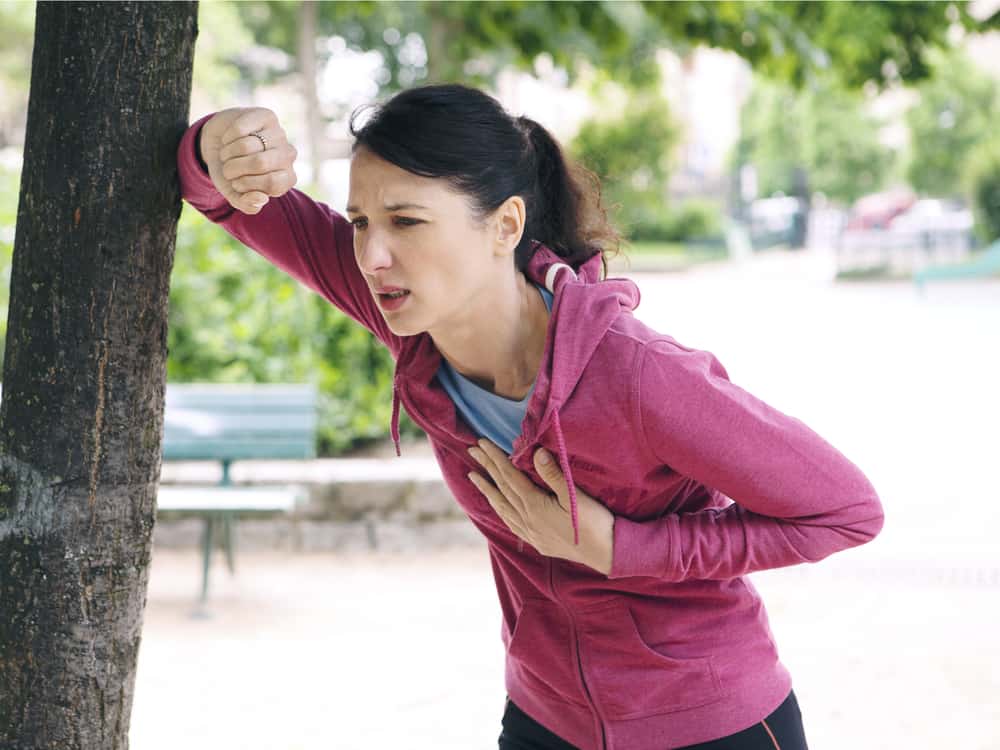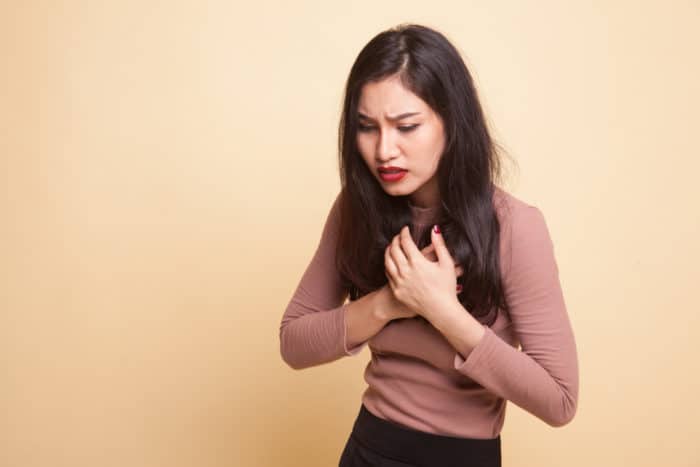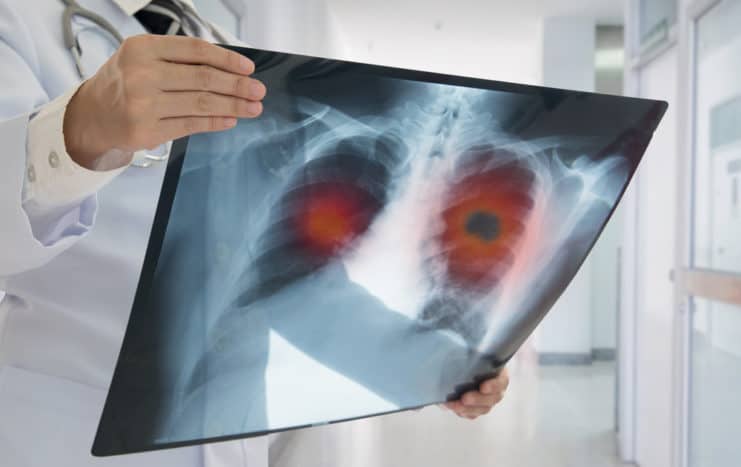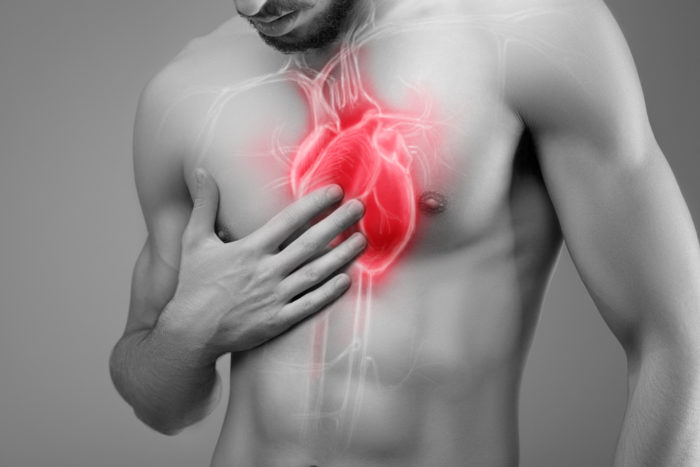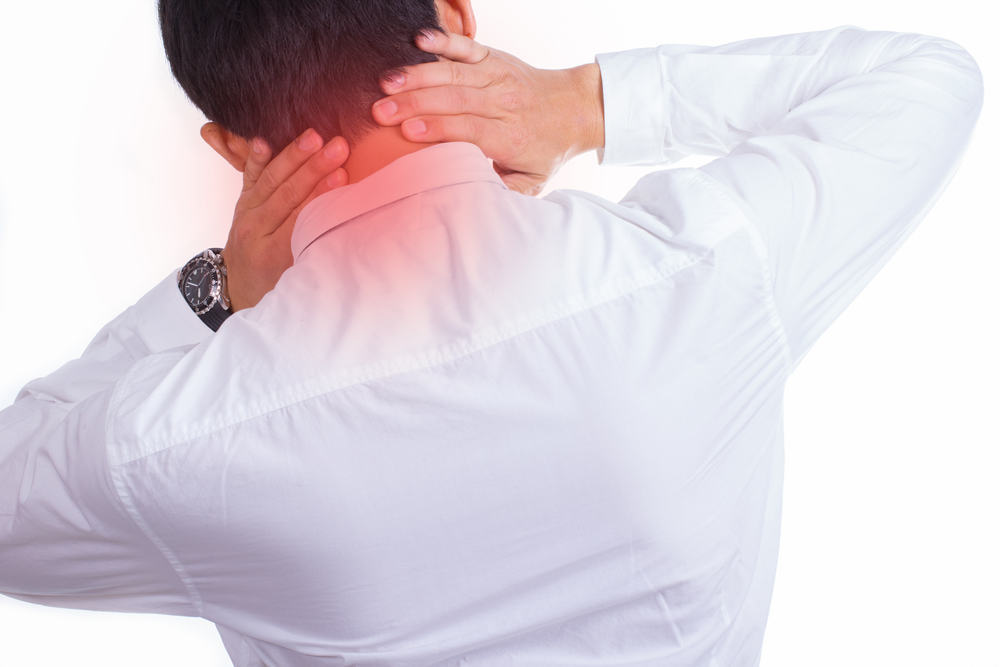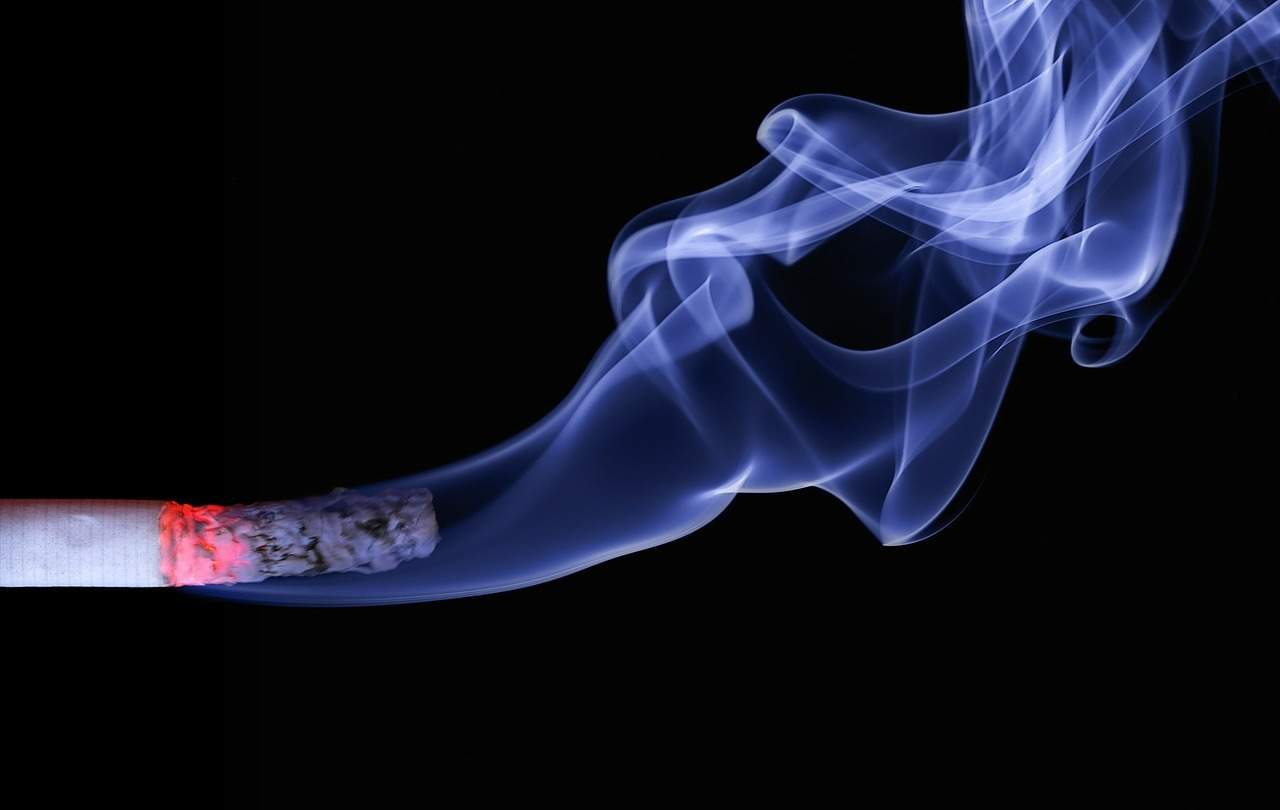Contents:
- Medical Video: How an asthma attack occurs
- Causes of shortness of breath that appear suddenly (acute)
- 1. Asthma
- 2. Carbon monoxide poisoning
- 3. Heart tamponade (excess fluid around the heart)
- 4. Hiatal hernias
- 5. Heart failure
- 6. Low blood pressure (hypotension)
- 7. Pulmonary embolism
- 8. Pneumothorax
- 9. Pneumonia
- Causes of long-term (chronic) shortness of breath
- Common cause
- Lung problems
- Heart problem
- Other problems that can cause shortness of breath
- How to overcome shortness of breath?
- 1. Breathing through the mouth
- 2. Sit in a chair
- 3. Lie down
- 4. Use a fan
- 5. Take medication
- Various options for shortness of breath
- 1. Bronchodilator
- 2. Antibiotics and antivirals
- 3. Diuretics
- Can you use herbal breathless medicine?
Medical Video: How an asthma attack occurs
When the lungs do not get enough air supply, you will feel shortness of breath or difficulty breathing. As a result, your breath becomes fast, shallow, and sometimes sounds "crunchy". The chest feels painful as if someone is wrapped around the rope tightly around your chest. All of these debilitating sensations are the most recognizable symptoms of asthma.
Not infrequently, banything that thinks that shortness of breath is definitely asthma. Though not necessarily. Shortness of breath can appear suddenly (acute) or is recurrent in the long term (chronic), and can be caused by a number of health problems other than asthma.
Causes of shortness of breath that appear suddenly (acute)
1. Asthma
Asthma is a respiratory disease caused by inflammation in the airways (bronchi). Inflammation causes the bronchi to become swollen, narrow, and continue to produce excess mucus.
As a result, you often feel short of breath or runny, and have difficulty breathing. You may feel the chest often aching like there is something that ties the rope tightly around the chest. Breath wheezing and "coughing" and coughing are also the most common symptoms of asthma.
2. Carbon monoxide poisoning
Carbon monoxide poisoning occurs when a person inhales too much carbon monoxide. Carbon monoxide is odorless, colorless, does not irritate the skin and eyes, but is very dangerous if too much settles in the body. Yes, this gas is very toxic and flammable. This gas comes from burning gas, oil, gasoline, solid fuel or wood.
After inhalation, carbon monoxide can be tightly bound in blood hemoglobin 200 times stronger than oxygen bonds. Carbon monoxide gas will come along with blood throughout the body, which will cause damage to cells and tissues due to lack of oxygen. As a result, you will experience various symptoms such as shortness of breath, chest pain, dizziness, nausea and vomiting.
The longer you breathe the gas, the worse the symptoms you get. When carbon monoxide levels have reached acute levels in the body, poisoning of these substances can cause death.
3. Heart tamponade (excess fluid around the heart)
Cardiac tamponade is a medical emergency when blood or fluid fills the space between the thin membranes that wrap around the heart (pericardium) and heart muscle. This condition provides a strong pressure on the heart that interferes with the heart's function in pumping blood throughout the body.
Lack of blood supply to the heart and the whole body can cause various symptoms such as shortness of breath, shortness of breath, chest pain (especially on the left side of the chest), and the chest feels full and depressed. If not treated immediately, heart temponade can cause shock, heart failure, other organ failure, and even death.
4. Hiatal hernias
A hernia is a term used to describe the inside of a body that protrudes from its place. Well, a hiatal hernia is a condition that causes the upper part of the abdomen to stand up to the opening of the diaphragm, the muscle separating the stomach from the chest. This muscle helps so that stomach acid does not rise into the esophagus.
If you have a hiatal hernia, acid stomach becomes easier to ride. The rise of stomach acid into the esophagus is called gastroesophageal reflux disease (GERD). This disease can cause complications in the stomach and throat. As a result, you may often experience heartburn (chest feels hot), difficulty breathing or shortness of breath, pain in the area of the chest or abdomen, difficulty swallowing, and so on.
5. Heart failure
Heart failure is a term used to describe the condition of a heart that cannot function properly and does not pump blood throughout the body efficiently. This condition is caused by a narrowing or blockage that occurs in the coronary arteries.
This narrowing of the blood vessels causes the bloodstream carrying oxygen to be blocked. As a result, the body's tissues do not get enough oxygen supply, giving rise to several symptoms such as shortness of breath, fatigue, out of focus, and accumulation of fluid in the organ.
6. Low blood pressure (hypotension)
Hypotension is a condition where blood pressure in the arteries is so low that blood cannot deliver enough oxygen and nutrients to the organs of the body. Clogged blood flow makes oxygen unable to flow throughout the body. This then causes symptoms of shortness of breath.
Hypotension is usually diagnosed when blood pressure reaches 90/60 or less, and is followed by several symptoms including dizziness, dehydration, difficulty concentrating, nausea, cold and damp skin, short or fast breathing, fatigue, feeling very thirsty, blurred vision, fainting (missing awareness).
7. Pulmonary embolism
Pulmonary embolism is a blockage in one of the pulmonary arteries in your lungs. This condition causes blood flow to one or both sides of the lungs to be very limited so that makes the chest feel tight and the heart rate increases, which makes you have difficulty breathing. Inflammation of the lung tissue and chest wall (pleura) can also cause chest pain that feels sharp.
8. Pneumothorax
Pneumothorax is a condition in which there is a collection of air flowing between the lungs and the chest wall. The collected air can suppress the lungs and make the lungs collapse (deflate).
An increase in lung wall pressure will block the lungs from expanding when we breathe. As a result, you will experience shortness of breath and other symptoms such as chest pain, heart palpitations, coughing, and so on.
9. Pneumonia
Pneumonia or infection in the lungs can also cause shortness of breath. Pneumonia is a disease that causes the air sacs in the lungs to become inflamed, swollen, and filled with fluid. This condition can be caused due to bacterial, viral, or fungal infections.
Foreign substances that cause infection will invade the air sacs which make the body lose oxygen to enter the blood. As a result, cells of other body people do not function properly due to lack of oxygen.
Causes of long-term (chronic) shortness of breath
Common cause
- Asthma. Asthma is a chronic disease that first appears in childhood and continues into adulthood. However, more than 25 percent of people with asthma have experienced an attack for the first time in adulthood. Asthma causes your airways to swell and narrow, causing a tight sensation when breathing.
- COPD (chronic obstructive pulmonary disease). COPD is a group of diseases that damage the lungs and reduce the supply of oxygen to the blood due to blocked airways due to inflammation or damage to the air sac. This makes sufferers often experience shortness of breath, tightness in the chest, wheezing, and coughing.
- Heart failure.Most cases of heart failure are caused by other diseases, such as coronary heart disease, arrhythmias, hypertension, diabetes, heart valve damage, obesity, heart defects, and so on.
- Interstitial lung disease. Interstitial lung disease is a group of diseases that attack lung tissue between and below the air sac. This condition is characterized by scarring in the pulmonary sac, causing the air storage space to shrink. HThis will affect the ability to breathe and channel enough oxygen into the bloodstream.
- Obesity. Obesity can cause shortness of breath because the excess fat around the abdomen and chest increases the work of the muscles that control breathing. As a result, you often experience shortness of breath or difficulty breathing. Even if you only do light activities.
Lung problems
- Lung cancer. The most typical symptom of this disease is a chronic cough that does not heal or even worsens over time. In addition, you may also feel your chest feel tight and generally get worse when breathing long. Not infrequently this makes it difficult for you to breathe.
- Pulmonary hypertension. Pulmonary hypertension occurs when the arteries in the lungs narrow, and the right side of the heart must work harder to pump blood to the lungs. Stunted blood flow makes oxygen unable to flow throughout the body, so the body lacks air. This then causes symptoms of shortness of breath.
- Sarcoidosis. This condition occurs when inflammatory cells grow excessively in different parts of the body, such as the lungs, lymph nodes, eyes, and skin. If inflammatory cells grow in the lungs, it can cause breathing to falter with wheezing (sounds like soft or "wheezing" whistles).
- Tuberculosis (TB). TB is a chronic respiratory disorder caused by a bacterial infection Mycobacterium tuberculosis. In symptoms of tuberculosis, complaints of shortness of breath that appear is a process of TB disease that increases mucus production. As a result it makes the airways narrow and damages the lung tissue.
Heart problem
- Cardiomyopathy. This disease is caused by a weakening of the heart muscle, stretching or having problems with its structure. This condition makes the heart unable to pump blood or function properly, so that body tissues do not get enough oxygen supply. Finally this gives rise to several symptoms such as shortness of breath.
- Arrhythmia. Arrhythmia is a heart disorder characterized by an abnormal heartbeat; can be too fast, too slow, too early or irregular. Heartbeat that is too fast or too slow causes the heart to not be able to pump blood effectively. As a result you will experience a series of symptoms such as shortness of breath, dizziness, chest pain, and others.
- Pericarditis.Pericarditis is swelling and irritation of the pericardium. The pericardium is the membrane of the sac around the heart, serves to hold the heart in place and lubricate the heart. The common symptoms of this disease are sharp chest pain behind the sternum or sternum, as well as short breathing or hunting while lying down.
Other problems that can cause shortness of breath
- Anemia.
- Broken ribs.
- Choking.
- Epiglotitis (partial swelling of the throat).
- Inhale foreign matter.
- Anxiety disorders.
- Guillain-Barre syndrome.
- Myasthenia gravis, which causes muscle weakness.
How to overcome shortness of breath?
How to deal with shortness of breath for everyone is not the same. But there are a few simple steps you can take when shortness of breath approaches.Bfollowing the first aid you can take to overcome shortness of breath:
1. Breathing through the mouth
This is a simple way you can do to control shortness of breath. This method helps to slow down the rate of breathing which makes every puff of your breath deeper and effective.
Not only that. breathing through the mouth can also help release the air that is stuck in the lungs. You can use this method at any time whenever you experience shortness of breath, especially when lifting heavy objects, climbing stairs, bending, and so on.
Here's the guide:
- Relax your shoulder and neck muscles.
- Slowly breathe from the nose, hold it for a few seconds.
- Pour your lips as if you are going to whistle whistling.
- Inhale slowly through the mouth.
2. Sit in a chair
Resting while sitting can help relax your body and relieve your breathing. To get started, make sure you are calm. Sit in a chair with both feet stepping on the floor. Bend your chest slightly forward. Place your elbows on your knees or support your chin with both hands. Make sure your neck and shoulder muscles remain relaxed.
3. Lie down
Many people experience shortness of breath while sleeping. Apart from making it uncomfortable, it can also reduce the quality and duration of your sleep. To overcome this, you can lie on the bed. Place a few pillows on your head and under your knees. Make sure your back stays in a straight position and your hands are on your side. Try to position your head higher than your body
This position helps facilitate the airways that have been blocked, making it easier for you to breathe.
4. Use a fan
A study found that cool air can help relieve shortness of breath. Directing a small fan or handheld fan to your face can help relieve symptoms of shortness of breath.
5. Take medication
For those of you who experience shortness of breath due to a serious illness, you may have to undergo treatment or take certain medications from a doctor. Consult your doctor about what treatment is right for you.
Various options for shortness of breath
It should be emphasized that before taking any breathless medication, you need to consult with your doctor to get a proper diagnosis of your health condition. Because the type and dosage of shortness of breath medication must be adjusted to the exact cause.
The following are the most common types of shortness of breath medicines available, at the pharmacy and with a doctor's prescription.
1. Bronchodilator
Bronchodilators are drugs that function to increase lung capacity to absorb oxygen so you can breathe more smoothly and reliably. Bronchodilator drugs must be combined with inhaled corticosteroids, and only given if symptoms do not improve after inhaling corticosteroids. Bronchodilators are available in the form of inhalers, tablets / pills, syrups, injections, and nebulizers.
There are three types of bronchodilator drugs commonly used, including:
- Anticholinergics (tiotropium, ipratropium, glycopyronium, and aclidinium)
- Beta-2 agonist (salmeterol, salbutamol / albuterol, and formoterol)
- Theophylline
Based on the time of work, bronchodilators are divided into two: fast reactions and slow reactions. Bronchodilator rapid reaction is usually given to someone who experiences acute (sudden) shortness of breath due to inflammation and narrowing of the airways, as in acute asthma attacks. While the bronchodilator slow reaction is more intended to control symptoms of shortness of breath in chronic lung disease (COPD) or chronic asthma.
Common side effects that can arise from the use of these drugs are usually chills, coughing, headaches, and diarrhea.
2. Antibiotics and antivirals
In cases of shortness of breath caused by pneumonia infection, prescribed shortness of breath medication will depend on the microbes that cause it - bacteria or viruses. Antibiotics will be prescribed by doctors to treat pneumonia caused by bacterial infections. One example is Xorim (cefuroxime). If your pneumonia is caused by a virus, your doctor can prescribe antiviral drugs, such as oseltamivir (Tamiflu) or zanamivir (relenza).
Do not stop or increase the dosage of the drug without the doctor's knowledge.
3. Diuretics
This type of drug is given to treat shortness of breath that occurs due to heart failure. In general, this drug serves to remove excess salt and water from the body through urine.
A side effect of using diuretics is that you will continue to urinate because diuretics increase urinary excretion of water and electrolytes. Therefore, this drug is called a "water tablet".
Can you use herbal breathless medicine?
For the use of herbal medicines, you should first consult your doctor. Because, the use of drugs together without further knowing the effect will risk worsening your body's health. For this reason, doctors need to check the content of herbal medicines and see how your kidneys and liver are.

